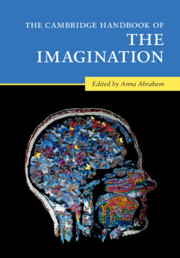Book contents
- The Cambridge Handbook of the Imagination
- The Cambridge Handbook of the Imagination
- Copyright page
- Dedication
- Contents
- Figures
- Contributors
- Acknowledgments
- 1 Surveying the Imagination Landscape
- Part I Theoretical Perspectives on the Imagination
- Part II Imagery-Based Forms of the Imagination
- Part III Intentionality-Based Forms of the Imagination
- Part IV Novel Combinatorial Forms of the Imagination
- Part V Phenomenology-Based Forms of the Imagination
- Part VI Altered States of the Imagination
- 40 Dreaming: Beyond Imagination and Perception
- 41 Dreaming is Imagination Roaming Freely, Based On Embodied Simulation, and Subserved by an Unconstrained Default Network
- 42 Aphantasia
- 43 Hypnosis and Imagination
- 44 Hallucinations and Imagination
- 45 The Psychiatry of Imagination
- 46 Meditation and Imagination
- 47 Flow in Performance and Creative Cognition – An Optimal State of Task-Based Adaptation
- 48 The Force of the Imagination
- Name Index
- Subject Index
- References
46 - Meditation and Imagination
from Part VI - Altered States of the Imagination
Published online by Cambridge University Press: 26 May 2020
- The Cambridge Handbook of the Imagination
- The Cambridge Handbook of the Imagination
- Copyright page
- Dedication
- Contents
- Figures
- Contributors
- Acknowledgments
- 1 Surveying the Imagination Landscape
- Part I Theoretical Perspectives on the Imagination
- Part II Imagery-Based Forms of the Imagination
- Part III Intentionality-Based Forms of the Imagination
- Part IV Novel Combinatorial Forms of the Imagination
- Part V Phenomenology-Based Forms of the Imagination
- Part VI Altered States of the Imagination
- 40 Dreaming: Beyond Imagination and Perception
- 41 Dreaming is Imagination Roaming Freely, Based On Embodied Simulation, and Subserved by an Unconstrained Default Network
- 42 Aphantasia
- 43 Hypnosis and Imagination
- 44 Hallucinations and Imagination
- 45 The Psychiatry of Imagination
- 46 Meditation and Imagination
- 47 Flow in Performance and Creative Cognition – An Optimal State of Task-Based Adaptation
- 48 The Force of the Imagination
- Name Index
- Subject Index
- References
Summary
This chapter explores the scope of imagination in the classical tantric texts and brings its salient features to a global philosophical discourse. Tantric texts treat imagination as a faculty of the mind that can be cultivated to its fullest extent. In this paradigm, imagination is an inherent power of the self, and upon its proper channeling, it can be transformed into the faculty of creativity, an inherent property of the self that remains otherwise dormant. These texts prescribe meticulous visualization processes in order to explore the limits of imagination. Apparently, what these texts meant by imagination is distinct from daydreaming or pure fantasy, as there is an integration of memory and attention in the course of projecting the mind to some intended objects or events. The central argument of this chapter is that this treatment of imagination as a faculty and the application of visualization for enhancing the power of imagination has the potential to address some key aspects in the contemporary philosophical discourse on imagination. This understanding of imagination can also help us devise ways to transform a subject’s self-assessment in order to assist him or her in negotiating his or her role in the socially constructed reality.
- Type
- Chapter
- Information
- The Cambridge Handbook of the Imagination , pp. 783 - 795Publisher: Cambridge University PressPrint publication year: 2020
References
- 6
- Cited by

